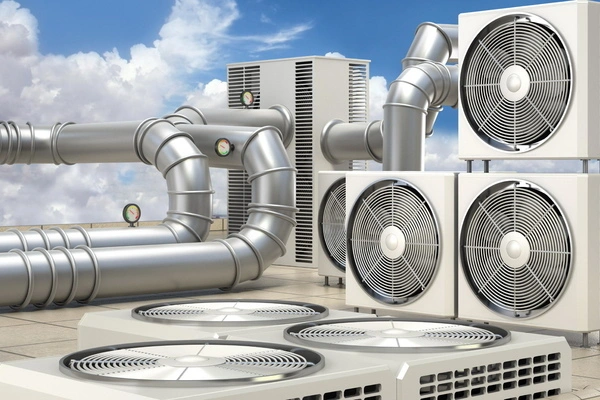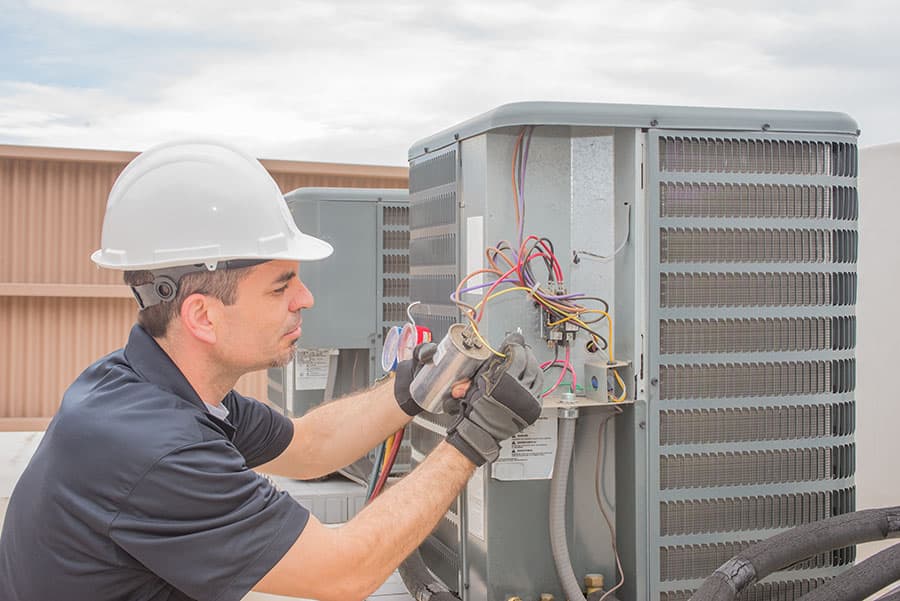Find out how HVAC experts recommend advanced heating and cooling solutions
Exploring the Necessary Parts of an Efficient HVAC System
An efficient cooling and heating system is built on several vital parts that operate in consistency. Each part, from the thermostat to the ductwork, plays an essential duty in keeping convenience and energy performance. Recognizing these aspects is crucial for enhancing performance and enhancing indoor air top quality. As one examines these components, the elaborate relationships in between them expose understandings into enhancing overall system effectiveness. What particular factors contribute most to this performance?
The Function of the Thermostat in Cooling And Heating Effectiveness
Usually ignored, the thermostat plays an essential role in the effectiveness of A/c systems. This small gadget acts as the primary control center, managing temperature level settings and making certain optimal comfort within an area. By accurately sensing the ambient temperature level, the thermostat connects with the ventilation, air, and home heating conditioning devices to maintain the preferred climate
An efficient thermostat decreases energy usage by triggering the heating and cooling system only when needed, thus preventing excessive heating or air conditioning. Modern programmable and wise thermostats improve this efficiency better by permitting individuals to set routines and remotely adjust settings, adjusting to everyday routines.
The placement of the thermostat is crucial; improper area can lead to imprecise temperature readings, resulting in ineffective procedure. On the whole, a well-functioning thermostat not only boosts comfort yet additionally adds significantly to power savings and the long life of the heating and cooling system.
Understanding the Significance of Air Filters
Air filters serve a vital feature in cooling and heating systems by assuring that the air distributing within a space continues to be healthy and balanced and clean. These filters catch dirt, allergens, and various other pollutants, avoiding them from being recirculated throughout the setting. By recording these fragments, air filters add to improved interior air quality, which can significantly profit occupants' health and wellness, specifically those with allergic reactions or respiratory conditions.
In addition, maintaining tidy air filters enhances the performance of a/c systems. Blocked filters can limit air movement, causing the system to function tougher to keep desired temperature levels, leading to raised power usage and greater energy expenses. On a regular basis replacing or cleaning up filters is a vital maintenance step that can lengthen the lifespan of heating and cooling equipment. Eventually, recognizing the relevance of air filters enables house owners and structure managers to take positive procedures to ensure a well-functioning, efficient heating and cooling system that advertises a comfy and risk-free indoor setting.

The Performance of the Heating System and Heatpump
Furnaces and warmth pumps are critical components of heating and cooling systems, in charge of giving heat during chillier months. Heating systems run by home heating air via combustion or electric resistance, after that dispersing it throughout the home via ducts. They commonly offer rapid heating and can be fueled by gas, electrical energy, or oil, depending on the system kind.
Alternatively, heatpump transfer warm rather than produce it. They draw out warm from the outside air or ground, even in low temperatures, and transfer it inside your home. HVAC experts. This twin functionality enables heat pumps to likewise offer air conditioning in warmer months, making them flexible options for year-round climate control
Both systems require correct upkeep to ensure effectiveness and durability. While furnaces master extreme cold, warm pumps can be helpful in moderate environments. Recognizing their distinct functionalities help property owners in choosing the most appropriate option for their heating needs.
Discovering the Air Conditioning System
The cooling system is a vital component of cooling and heating systems, available in different types to match different needs. Recognizing the effectiveness ratings of these systems is essential for making educated selections concerning power usage and cost. This section will certainly discover the varied sorts More Bonuses of ac unit and clear up how performance scores effect performance.
Sorts Of Air Conditioners
While various variables affect the selection of air conditioning systems, recognizing the various kinds available is important for house owners and structure supervisors alike. Central air conditioning conditioners are designed to cool down whole homes or buildings, making use of a network of air ducts for airflow. Home window units provide an even more local remedy, suitable for solitary areas or little rooms. Portable air conditioners provide adaptability, allowing customers to move the system as required. Ductless mini-split systems are another choice, combining the effectiveness of central systems with the ease of zoning, as they require no ductwork. Geothermal systems harness the earth's temperature level for energy-efficient cooling. Each kind comes with distinctive benefits, making educated options important for effective climate control.

Effectiveness Scores Explained
Comprehending performance rankings is essential for selecting the appropriate cooling unit, as these metrics provide insight into the system's performance and energy intake. One of the most typical score for a/c unit is the Seasonal Power Efficiency Ratio (SEER), which gauges the cooling result throughout a normal air conditioning season divided by the overall electric energy input. A greater SEER suggests much better performance. In addition, the Energy Effectiveness Ratio (EER) is made use of for gauging efficiency under certain conditions. An additional important metric is the Power Star qualification, which signifies that a system meets rigorous energy efficiency standards. By assessing these rankings, consumers can make enlightened selections that not just enhance convenience yet also minimize energy costs and ecological impact.
The Importance of Ductwork and Air flow
Efficient ductwork design and air movement monitoring play important duties in the overall effectiveness and performance of heating and cooling systems. Appropriate ductwork assurances that conditioned air is distributed uniformly throughout an area, decreasing temperature variations and enhancing comfort. Well-designed air ducts minimize resistance to air flow, lowering the workload on HVAC tools and inevitably reducing power intake.
Airflow administration involves tactically placing vents and signs up to improve the flow of air. This prevents common issues such as hot or chilly spots, which can happen when air flow is blocked or improperly balanced. Furthermore, the appropriate duct products and insulation can further improve efficiency by minimizing heat loss or gain during air transportation.
A reliable ductwork system not only contributes to power cost savings however can additionally lengthen the life-span of cooling and heating tools by minimizing unneeded pressure (HVAC experts). Understanding the significance of ductwork and airflow is important for achieving peak A/c system efficiency.
Routine Upkeep Practices to Improve Performance
Normal upkeep methods are essential for making certain peak efficiency of HVAC systems. These techniques include regular inspections, cleansing, and essential fixings to keep the system running efficiently. Frequently transforming air filters is crucial, as blocked filters can obstruct air movement and minimize performance. On top of that, service technicians need to check and tidy evaporator and condenser coils to stop getting too hot and power wastage.
Annual expert examinations are additionally recommended, as skilled specialists can determine possible problems before they rise. Lubing relocating parts decreases damage, adding to a longer lifespan for the system. Making certain that the thermostat operates correctly aids in preserving suitable temperature control.
Regularly Asked Inquiries
How Often Should I Replace My Thermostat?
Thermostats should commonly be replaced every 5 to 10 years, depending upon usage and technology improvements. Normal checks are advisable to ensure peak go to my blog efficiency, particularly if experiencing inconsistent temperature level control or raised power expenses.
What Dimension Air Filter Is Finest for My A/c System?
The most effective dimension air filter for an a/c system differs by system style. Normally, it's important to speak with the owner's manual or check the existing filter measurements to guarantee peak performance and air quality.
Can I Install a Heatpump Myself?
Installing a warm pump individually is feasible for competent people, however it requires knowledge of regional codes and electric systems. Working with a professional is advised to ensure correct installment and suitable system performance.
Exactly how Do I Know if My Ductwork Is Efficient?
To identify ductwork effectiveness, one should look for leaks, procedure air movement at vents, check insulation quality, and assess temperature level my link distinctions in between supply and return ducts. Expert analyses can give thorough insights right into overall performance.
What Are Indicators My Heating And Cooling Needs Immediate Maintenance?
Indications that a heating and cooling system needs immediate maintenance consist of unusual sounds, inconsistent temperatures, enhanced power costs, undesirable smells, and frequent biking. Addressing these problems promptly can prevent more damages and guarantee top system performance.
Air filters offer a crucial function in HVAC systems by ensuring that the air circulating within a room remains tidy and healthy. Additionally, preserving tidy air filters improves the effectiveness of Cooling and heating systems. Ductless mini-split systems are an additional choice, combining the efficiency of main systems with the convenience of zoning, as they call for no ductwork. Understanding performance scores is vital for choosing the best air conditioning unit, as these metrics provide understanding right into the system's performance and energy intake. The finest size air filter for an A/c system differs by system design.